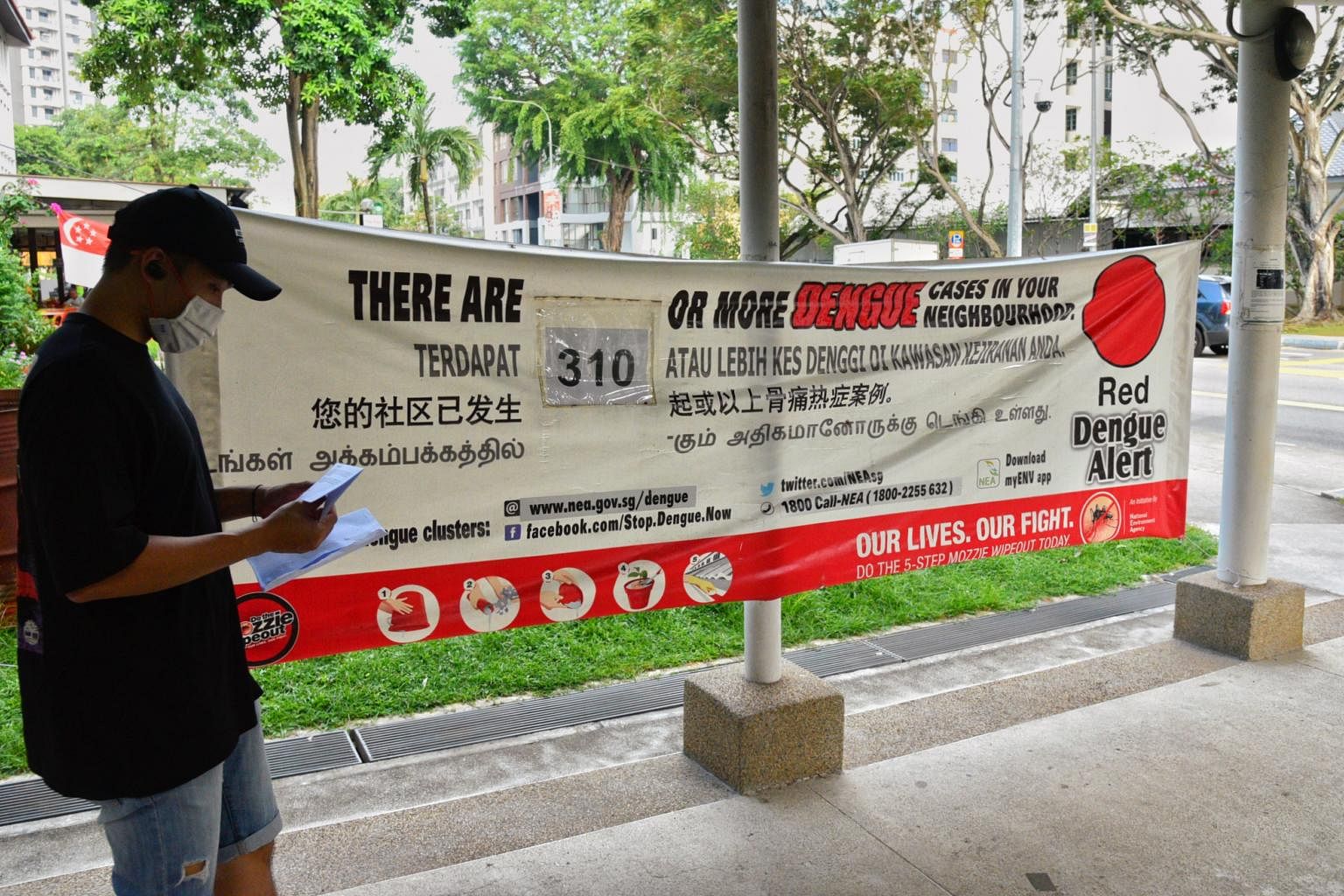askST: How long will my dengue fever last? Will drinking papaya leaf juice help?
Sign up now: Get ST's newsletters delivered to your inbox

The number of weekly reported cases reaching 736 in the week ending April 16,
PHOTO: ST FILE
Timothy Goh
Follow topic:
SINGAPORE - The nation is seeing a surge in dengue infections, with the number of weekly reported cases reaching 736 in the week ending April 16, up by 93 cases from the week before.
This is the highest reported weekly caseload since the week ending Sept 5, 2020.
With more people contracting dengue here, The Straits Times looks at what you need to know if you come down with it.
Q: What are the signs and symptoms of dengue fever?
A: According to the Dengue Outpatient Management (DOM) clinic at the National University Hospital (NUH), dengue symptoms will usually develop within four to seven days after someone is bitten by an infected mosquito.
Someone likely has dengue if they have a fever and two of the following symptoms: diarrhoea, fatigue, mild bleeding - such as nosebleed or bleeding gums - muscle aches or bone aches, nausea or vomiting, rash, severe eye pain, and severe headache.
Q: I think I may have dengue, but I am not sure. What should I do?
A: Dr Jolene Oon, clinical director of the DOM clinic, said that, if uncertain, one should visit their nearest polyclinic or general practitioner (GP) clinic to get assessed. Those with symptoms that are suggestive of dengue may be asked to take a blood test for confirmation.
Q: How do I know whether I have Covid-19 or dengue?
A: A Covid-19 swab test or a dengue test will confirm what is the case, said Dr Oon, who is also a consultant at NUH's Division of Infectious Diseases. Someone who has both Covid-19 and dengue will usually be admitted to the hospital to make it easier to monitor them.
Q: I have dengue. How long will my fever last?
A: For most patients, fever should subside after about three to five days, although some will continue to have fever until the seventh day of their illness, said Dr Oon. However, around the time a patient's fever starts to settle, their platelet count will also start dropping quite significantly.
During this critical phase, which typically lasts from day three to six of illness, patients may get dehydrated and will need to be monitored very closely.
By about day seven or eight of the illness, a patient's platelet count will typically start to rise again and their fever fall, meaning they are on the road to recovery.
Q: If I have dengue, do I need to stay in the hospital?
A: Ideally, all dengue patients who are clinically well and without warning signs should not be admitted to the hospital, said Dr Oon.
However, patients with any of the following warning signs should typically be admitted: abdominal pain or tenderness, persistent vomiting, mucosal bleed and lethargy or restlessness.
Patients are usually discharged if they have had no fever for 48 hours, their overall clinical status has improved, and their platelet count is on the rise again.
Q: What should I do while recovering from dengue at home?
A: The DOM clinic advises patients with dengue to avoid painkillers that contain aspirin, such as Ibuprofen, as well as contact sports, to prevent injuries that can lead to bleeding.
Recovering patients should get ample rest and drink at least 2 to 3 litres of water a day. Dr Oon added that patients recovering at home will also need to visit a clinic daily for an assessment and a blood test.
Q: When should I visit the emergency department?
A: Patients should visit the nearest emergency medical department if they experience any of the following symptoms: black, tarry stools, bleeding from nose or gums, difficulty breathing, drowsiness or irritability, paleness, cold or clammy skin, persistent vomiting, severe abdominal pain, and vomiting blood or passing it out in urine or faeces.
Q: I've heard people saying papaya leaf juice can help me recover from dengue. Is this true?
A: There is no clear scientific evidence that drinking papaya leaf juice can help speed up one's recovery, said Dr Oon. In addition, some people may have a reaction to the juice and suffer other injuries from it, she cautioned.
Dr Oon added that a patient's platelet count will recover without the help of the juice, and patients should simply manage their symptoms and ensure they get enough hydration.


